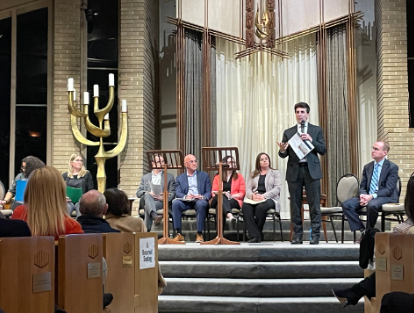Staff Writer

While some high school students begin their search for colleges, some teenagers are on a different kind of search.
A search for their biological parents.
According to the Evan B. Donaldson Adoption Institute, just over 2 percent of all American children are adopted. But, for the other 98 percent, it may be hard to understand what an adopted child goes through.
People who are adopted frequently express gratitude towards their adoption. They also have stories about their shocking discovery of their adoption and have come to the realization that they are no different than anybody else. Adoption has provided them with many unique emotions and values.
“I treasure every single moment. I have the greatest family, the most amazing opportunities, and I am the luckiest person in the world,” Molly Shulman’10 said on how her adoption has had an impact in her life.
Not taking family for granted, as well as other opportunities in life, are some of the feelings adopted kids expressed. For those who know people who are adopted or want to know more about adoption, the reaction to being adopted can sometimes be a topic of interest.
For Shulman, she never really had a reaction; she felt that it was just part of her, even saying that it was no different than her hair color. For others, it can be slightly shocking and confusing.
“I was somewhat surprised and confused when I was told I was adopted,” Melissa Goldstein ’10 said.
Others simply do not remember their initial reaction, but now feel like they begin to understand their own identity.
“Finding out I was adopted was so long ago I don’t remember what it was like,” Eliza Seaver ’12 said. “ I feel like it was the first time I had really been able to comprehend what [being adopted] meant.”
Some children find out they were adopted when they were in their late childhood. Others do not specifically remember an instance when they didn’t know they were adopted.
For Seaver, she was always aware of her adoption, but unaware of what it meant to her personally. The same situation was true for Shulman.
“I grew up knowing, there was no point in my life where I ‘found out’. Its just part of my life,” Shulman expressed.
Even though adopted children may not give much thought to their adoption when they are young, many look for their birth parents when they become teenagers. In fact, the teenage years are the most common time for adopted children to begin a search for their birth parents. Keeping an open mind when going into the search for biological parents has proven to be a necessary component. For some, the result will look rewarding.
“I have information about my birth parents and may meet them in the future,” Shulman said. She continued on to say she was “always interested in knowing her biological parents.”
For others, one’s personal life can get in the way of desires and lead to unrewarding results.
“We have tried multiple times to try and find my biological parents. But at some point, something happens and the search is ended, most of the time for family emergencies, the most recent the death of my uncle,” Seaver said.
Although not everybody’s search stops so abruptly, sometimes the reason is not just because the records were lost underwater in a flood, which delayed Seaver’s search even further. One other reason is because children do not know how to confront their parents on the issue of searching for another parent, without experiencing an awkward situation.
“Asking about my biological parents has always been and still is an uncomfortable topic for me my adoptive parents about,” Goldstein said. She later expressed that it was “ because I am scared to know the truth, so I still don’t know anything.”
Goldstein has recently starting getting over her fear by searching, although unsuccessfully, for her biological parents alone.
The idea behind adoption seems to have very little to do with the actual adoption, Different values, gratitude, luck, or simply just a basic understanding about one’s life and the opportunities that come from being adopted shape the adoption’s meaning.













































Claudia Corrigan D'Arcy • Mar 12, 2010 at 10:56 pm
Another mother who relinquished here; I found my son at age 17 and met him in peson at age 19. WHat is also very benefitial and healthy with teens searching their biological families is that that frequently they are already dealing with creating their own idenity at these ages. By meeting their biological families and hearing the beggings of their own stories and truhs, they are able to intergrate those missings parts of their life stories seemlessly into the developing adult idenities. It’s often much easier to do so at this age becasue it is still morphic and not fully formed.
It’s alos good to note that many adoptees would have an easier search for their truth if adoptees had legal access to their original birth certificates at age 18! In 44 states adoptees ares till denies their civil rights and denied their original legal idenity!
Lorraine Dusky • Mar 12, 2010 at 1:30 pm
Hi, I’m a mother who surrendered her child to adoption many years ago and I found her when she was fifteen. And her parents, though a little fearful at first, were glad. Your feature was excellent, hitting as it does on the issues that plague adopted kids. And remember, most mothers want to know their children and only gave them up because they were desperate at the time and felt they had no choice.
Keep up the good work.